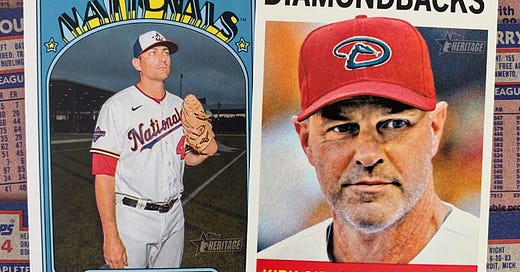Welcome to Warning Track Power, a weekly newsletter of baseball stories and analysis grounded in front office and scouting experiences and the personalities encountered along the way.
The catcher flashed the signs.
First, all five fingers splayed out. Then four. Then two. And finally just one.
These digits, however, were not calling for a ball to be thrown homeward. So while the pitcher held his set position, the batter waited. And the fans waited while the catcher obliged in presenting the formality of a target, his mitt merely a low-level prop in this game of control.
The runner took his lead off first.
The pitcher held. And held. Maybe, as he held the ball and refused to engage with the batter, he counted to himself. Maybe he felt momentarily uncomfortable. Maybe he cursed the manager who had called for this hold.
That moment, where baseball strategy thumbs its nose at pace of play, requires discipline and commitment. It’s unnatural, after all, for a pitcher not to, well, pitch.
Eventually, the batter asked for timeout, having grown impatient after waiting too long for a pitch that was never coming.
We like to talk about the little things in baseball. In 2011, controlling the running game was one of the biggest little things that changed the culture in the Diamondbacks clubhouse and propelled the team to 94 wins and a division title.
“People like doing things with rhythm,” said Alan Trammell, bench coach for that D-backs team.
Kirk Gibson, who won NL Manager of the Year in 2011, enjoyed disrupting rhythm. He often spoke — in Spring Training meetings, after games in his office — about breaking down a baserunner mentally.
Trammell remarked that many pitchers will throw over twice and won’t do it again. Gibson, on the other hand, had pitchers throw over three, four, five times in a row.
“Gibby took it to another level,” his former Tigers teammate Trammell said. “People got pissed off at him, and he knew it, and he did it more.”
It was a source of pride for Gibson. The building boos of a restless crowd only encouraged the behavior. He didn’t care. He talked about the physical beating a baserunner takes constantly diving into the bag. He had experienced it first hand.
“If I was on the other side, I probably would’ve been mad, too,” said Trammell.
Of course, this practice is only possible in a world without pitch clocks, without “disengagement” limits.
“That was one of the beauties of baseball: no clock.”
For that 2011 team, there was an array of holds and slide steps that could be employed by a pitcher to disrupt timing. It’s amazing how a defense can seize control of the game’s tempo by actively doing nothing.
A pitcher could hold for three seconds then deliver the pitch, or he could hold and step off the rubber. The same options were available at five-second increments.
Daring the batter to call time; that’s part of the game within the game.
“Pitchers bought into it because we had success. We controlled the running game,” Trammell said. Of course, he admitted, it disrupts the pitcher’s rhythm, too.
“He was pretty obsessed with controlling the running game,” said Daniel Hudson, a member of the Arizona starting rotation that season. “I understood his reasoning behind it as he told us all the time. But it would definitely get annoying.”
Hudson, who recorded the final out of the 2019 World Series for the Nationals, got specific. “Two-out, two-strike pickoff attempts, and I’m trying to concentrate on getting MVP Matt Kemp out in a playoff race.”
When his former pitcher’s comments were shared, Gibson didn’t contest any of it. But he was quick to add: “The thing about it is that if they did the work, they all benefitted from it.” And they did. Every player bought into the high level of defensive intensity. It became part of the team’s identity.
When pitch clocks are introduced next season, this dynamic of the game will be gone. Yet change will not bother Gibson.
“I’ve got no problem with the guys making them move the game [along]… teams are gonna find ways to exploit it,” he said.
Meanwhile, on a field far from removed from pitch clocks and pickoffs, 6U girls fall ball is starting to take shape. The Blue Cheetahs made significant strides between their first two weeks of practices and games.
In the bottom of the first inning last weekend, in a setting where neither outs nor runs are counted, the opposing team’s leadoff hitter grounded the ball off the tee and into the glove of our pitcher. The pitcher calmly turned towards first and threw a one-hopper that was gathered by the girl playing near the bag. She stepped on first well before the batter approached.
Remember, safe or out is not a concern in this league. Each girl runs the bases station by station, as they should at this age.
But, man, I was still in disbelief. The first batter of the home half of the game, and we had a clean play. Had anyone been keeping score, which would have been deeply concerning on a number of levels, the play would have been recorded as a straightforward 1-3. Good, clean softball.
And my coaching day only got better from there. At the conclusion of the game, one of the girls gave out gift bags to all of her teammates.
The contents included scrunchies, ribbons, and other hair accessories that I cannot confidently identify. There were also softball-themed rubber bracelets for each girl. I was excited to see the girls, still learning each other’s names and figuring out how to interact with each other on the all-dirt infield, united by something more familiar to all of them.
Then I heard “Here, Coach.”
Was it really for me? A gift bag of my own!
What a bald man does with hair ties isn’t important. I had been accepted. A child who wasn’t my daughter wanted me to have matching team bracelets, too.
I haven’t taken them off all week. I can’t wait for Sunday.
WTP congratulates Albert Pujols on hitting his 700th home run! More about Albert next week. Subscribe now and never miss a single edition.






